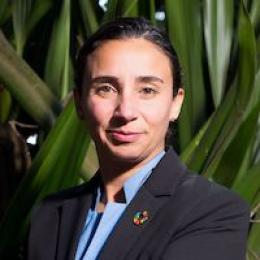Sogol Jafarzadeh is an Environmental Scientist with over 15 years of experience in environmental policy and inclusive governance. She has worked extensively in climate and water diplomacy, with a strong focus on gender and equity, serving various regional and international agencies.
As UNU-INWEH’s UN and Government Relations Coordinator and Gender and Capacity Building Focal Point for Africa, Sogol engages with the UN system, member states, and diverse stakeholders to foster partnerships and advance cooperation on water, sanitation, health, climate, and environmental issues, particularly their gender and justice dimensions. She is a member of the Women in Water Diplomacy Network and serves on the Network’s Process Support Team.
Prior to UNU, Sogol served as Environmental Affairs Adviser at the Organization for Security and Co-operation in Europe (OSCE), where she focused on transboundary water cooperation and water diplomacy. She also acted as gender focal point and led the establishment of the Women in Water Management Network in Central Asia and Afghanistan. She has previously worked with UNEP and UNDP on environmental policy, including efforts to combat sand and dust storms.
Sogol holds an MSc in Environmental Sciences from ETH Zurich and a postgraduate certificate in Conservation Biology from the Earth Institute at Columbia University. She has taught environmental sciences and psychology at the City College of New York and conducted research at ETH Zurich on land degradation in water-scarce rangelands. Based in Harare, Zimbabwe, she works closely with regional partners and donors to identify collaboration opportunities and implement projects across Africa.

